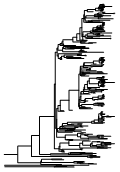About
Dengue causes significant morbidity and mortality worldwide, with millions of symptomatic cases occurring throughout the central band of the world each year. Large increases in cases are often associated with a shift in predominant serotypes and/or genotypes. The mechanisms that drive these shifts are not well understood. In addition, imperfect performance of dengue vaccines has highlighted our poor current understanding of dengue immunity.
In a series of projects in collaboration with University of Florida, Walter Reed, University of Cambridge as well as partners in Thailand, the Mathematical Modelling of Infectious Diseases Unit is characterizing in depth the antigenic and genetic variability of dengue viruses in Thailand using historically isolated viruses covering the last 50 years. These sequences provide a snapshot of the viral diversity at different time points in history. In addition, we are assessing the antigenic behavior of these historic viruses by characterizing their ability to be neutralized by human and animal sera that have been infected by different dengue viruses.
These datasets provide a comprehensive insight of both how the genome of the dengue virus has evolved in a single setting and the impact of host population immunity. This study will have implications for the design of vaccines and assess the likely future antigenic evolution of viruses.


